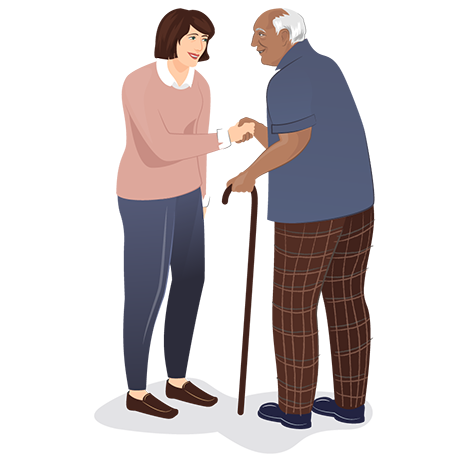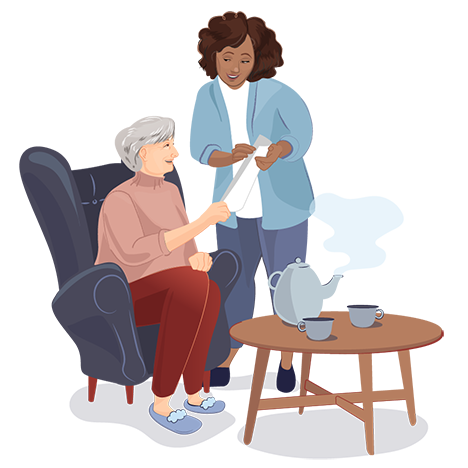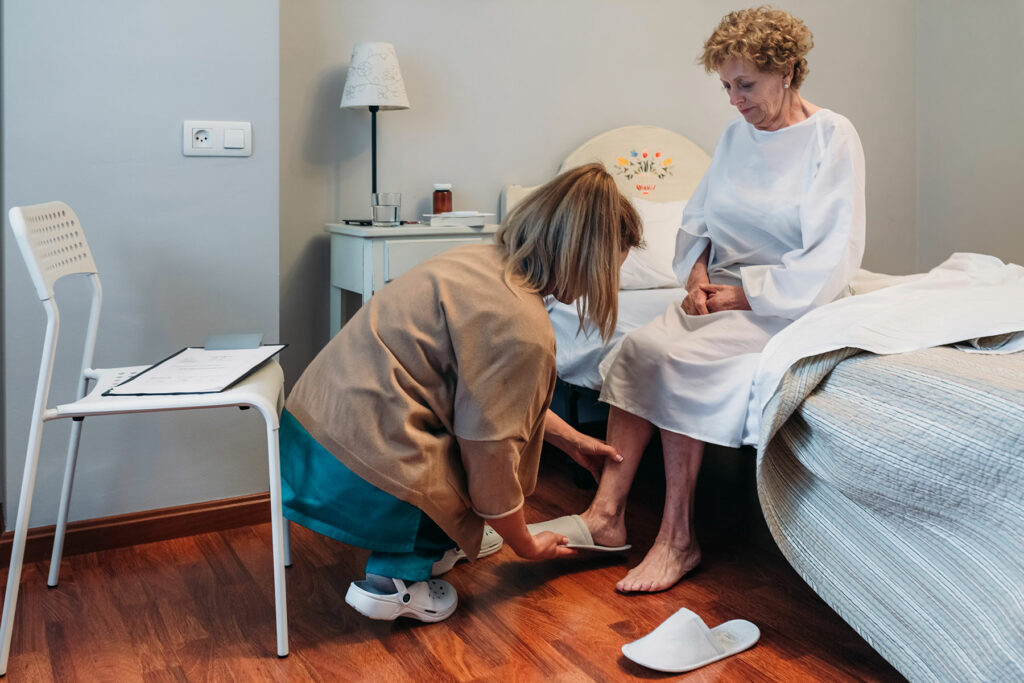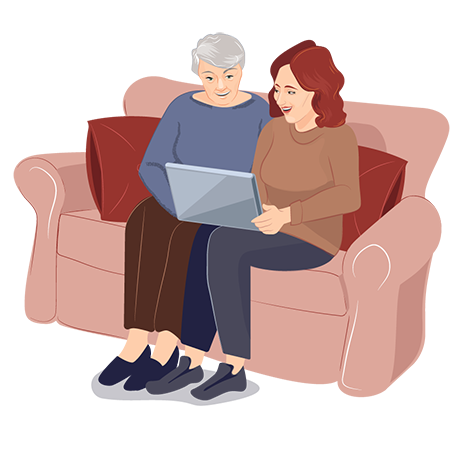
Live-in Care vs Care Home: What’s Right for Me?
If you or a loved one are in a position where you may be considering live-in care or a care home, you will likely have many questions.



Speak to one of our experts
Our friendly experts are here to help from 9am to 7pm, 7 days a week.
If you or your loved one may need to transition to full-time care, there are a few options to think about. These include live-in care for the elderly or moving into a care home. Both have their advantages, and for some, elderly live-in care may be suited to them. In this guide, we look at the key differences between live-in care at home and care home, so you can make the right decision for your parent or loved one.
What is live in care for the elderly?
How does live-in care differ from a care home?
Live-in care vs care home: Deciding what’s right for you
What is live-in care for the elderly?
Live-in care for the elderly is a service where a specialist carer lives in the home of a client, to provide continual, one-on-one care, tailored to their specific needs. Elderly live in care is often a popular choice as it avoids the client having to leave their home and familiar surroundings, to receive the exact care they need, when they need it.
A live in carer for elderly people can help with all household tasks, and provide companionship and friendship for as long as is needed.
Many care homes, or residential homes, as they are also called, offer social activities on site, such as bingo, crafts, group activities, singing or even outings.
How does live-in care differ from a care home?
A care home differs from live-in care as it involves a ream of carers providing care to support multiple residents throughout the day. Some people may prefer to move to a care home for the social aspects it offers. Many care homes, or residential homes, as they are also called, offer social activities on site, such as bingo, crafts, group activities, singing or even outings. Care homes may be more suited if your relative struggles to sleep and needs continuous care throughout the night. However, elderly live-in care is preferred by many people too, purely because it offers specialist care from one person.
We explore the main advantages of live-in home help for the elderly below and compare them to living in a care home, so you can make the right decision for your parent or loved one.
Advantages of live-in care for the elderly
Elderly live-in care is better for couples
Elderly live-in care is often a preferred choice for couples, as it means they can stay in their home and received specialist care that doesn’t disrupt their living situation. It can be distressing to think you may not be able to stay with your partner in a care home, and the need for a carer shouldn’t mean that lives are completely disrupted. It’s for this reason that an elderly live in carer is a great choice for couples, enabling them to enjoy their home for years to come, getting to know one carer who can see to both their needs.

Elderly live-in care avoids too much upheaval
Many of us have a strong emotional tie to the home we may have lived in for years, even decades. If we have made it our wish to remain at home and it can be incredibly upsetting to have to move into an unfamiliar place, making live-in care an ideal choice. Many people simply choose live in care for this reason. They stay at home, feeling safe and secure in a familiar place.
You can receive specialist elderly live-in care
Live-in care tends to be the preferred option for those who have dementia or a long-term illness. This is because elderly live-in care can offer specially trained carers who are familiar with dementia and can provide bespoke care, as the needs of the client change. Dementia is a very complex disease that can change rapidly, and one-on-one specialist dementia care can provide just the right level of support your relative or loved one needs.
Elderly live-in care offers companionship and friendship
Elderly live-in care naturally enables a stronger relationship to form. The client and client’s family members can get to know each other on a friendly basis, with the carer becoming a regular companion. This is as opposed to your loved one receiving care from multiple different carers, which, especially for those who struggle with memory, can be confusing and distressing.
Elderly live-in care offers flexibility and full control
Another reason why elderly live in care is so popular is because it offers full control and flexibility to the client. When living in a care home, waking times, mealtimes and routines are set and structured to suit the entire care home and other residents. Although some people may prefer this, it can be hard to adjust to a completely new routine set by someone else. An elderly live-in carer will plan their time around the client, offering flexibility and control with routines. This can be more relaxing and reassuring for a loved one, who may wake at a particular time or prefer meal times later or earlier. Live in care at home offers a more comforting familiar type of care, with the needs of the individual put above all else.

You can control mealtimes with live-in care at home
When it comes to food choices and personal nutrition, live-in care often offers more scope and choice. This is because only one person’s needs are being catered for as opposed to many. This means more variety, and more varied meals are easier to cook, and personal taste preferences can be considered without too much hassle. Your loved one may not want to cause a fuss, but this shouldn’t mean that they don’t enjoy their mealtimes. This is another main reason why people choose live-in care at home.
There are no restrictions to pets with live-in care
Wherever feasible, clients can keep their beloved pet, as a live-in carer can look after the pet’s needs at home. This service isn’t feasible or possible in care homes. Needing care shouldn’t mean that your relatives’ life is turned upside down, and a pet offers additional comfort, companionship and routine, which can be fully catered for by a live-in carer for the elderly.
A trial period can be arranged quickly
If you decide that you would like to try live-in care, then this can be arranged in a matter of days and you can actually test out how well it works. In contrast, many care homes have waiting periods of weeks or even months. Suitable for rural and remote locations. It can be very hard indeed for people who need live in care at home to have it delivered to them if they live remotely. This problem is solved if you decide to proceed with live-in elderly care, as the carer will be happy to travel for many hours to their placement.
Speak to a team member to arrange elderly live-in care today.
Advantages of a care home
A care home may be more suited for those with more demanding care needs
Care homes for the elderly can be a place in which a person who has become unsafe at home, possibly due to lack of mobility, falling or erratic behaviour will be safe. For example, if someone is a danger to themselves and may need consistent supervision from a number of carers at once, at this point of their care, a care home would be more suited than a single carer who may not be able to cope with their specific needs.
Care homes can be more sociable
There can be good opportunities for companionship in care homes for the elderly, with many staff who can be excellent at engaging with their clients. In addition, there is also an opportunity for clients to socialise with one another or take part in activities such as sing-alongs or games.
Specialised care homes may be more suitable for specialised needs
Many residential care homes provide specialised care for those with particular needs and specific nurse training. Homes may specialise in dementia, anxiety and depression, alcohol dependency, palliative care or physical disability, which means that expertise is likely to be increased and centralised.
Additional supervision of medication and care
All elderly care homes are required to have medication management and care systems in place which means that medication and care should be accurately and methodically administered to all clients. This can be better if a person’s care needs are complex, or if they struggle to take medication physically. Care homes may be preferred due to the extra supervision that’s offered, with multiple care nurses and carers on shift to deal with difficult situations if they arise.

Disadvantages of a care home
Care homes can be expensive
Care homes for the elderly can be expensive depending on the location within the UK, the quality of accommodation offered, and the level of care needed. With more elderly people needing care, care homes can accommodate larger fees and regularly increase fees without warning. In such situations, elderly live-in care may be preferred as costs can be tailored for the individual, and be less expensive thanks to the minimal overheads. With elderly live in care, there is no building maintenance to pay for or no wider business costs to consider when setting a price. Additionally, the resident will only pay for the care they actually need, which enables live in care agencies to provide set costs which are accurate and reflective on a case by case basis.
Can occasionally be isolating
Many elderly people who move into care homes feel lonely and isolated, as they may not have the mobility or strength to attend group sessions. If an elderly person is constrained to their room, they may struggle to involve themselves and feel cut off, with only regular timed visits from carers for mealtimes, or medication. Additionally, a care home is a new, unfamiliar environment, with new carers and residents arriving all the time, which can make it feel less like home.
Lack of flexibility and control
A new resident of a care home may be surprised by the lack of choice in some areas. For example, you will no longer have the freedom to decide what you eat and when. You may not be able to decide when you would like to go to bed, or if you would prefer to stay up later. This can feel detrimental to a person’s sense of independence, particularly if you are new to the arrangement and have been used to complete independence previously.

Elderly live-in care vs care home: Deciding what’s right for you
How we can help
We will listen carefully and understand your situation and begin to build a picture of the type of care that you or a loved one needs. We pay careful attention to medical requirements, as well as your personal preferences.
A member of our dedicated and experienced team will select your perfect carer and organise the finer details making it a pleasurable and efficient process. We will then arrange for a telephone conference call between ourselves and the chosen carer so that you can ask any questions and begin to build a relationship.
To start a conversation about live-in care with one of our friendly care team contact us today to see how we can help. Explore our website to find out how we can help you find the right care for your loved one.







